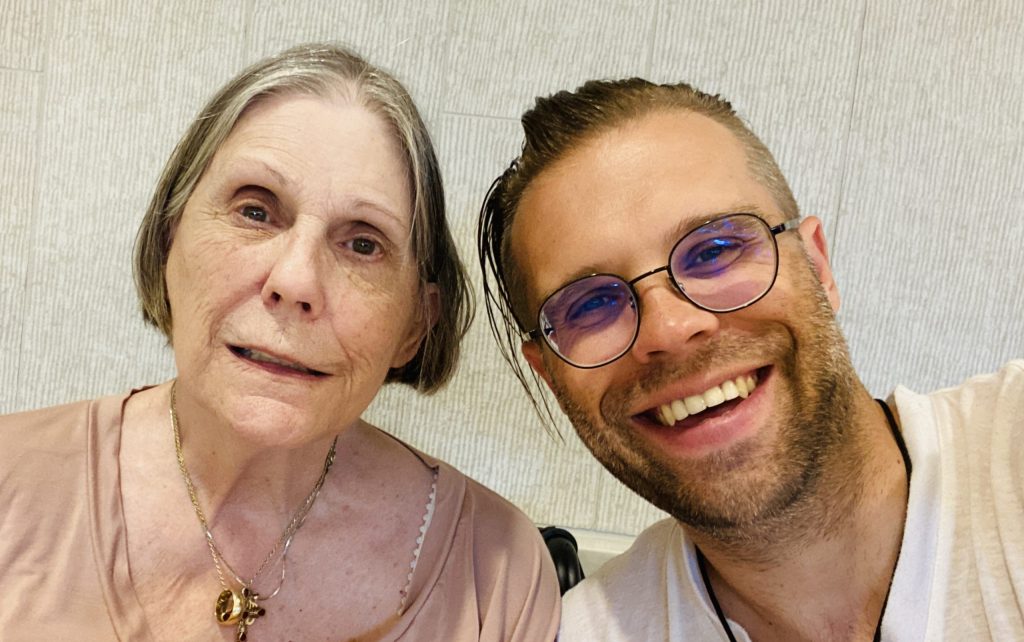Dear friends,
I hope this finds you well!
I haven’t published Stop & Think for a month. I’ve been writing like crazy but totally immersed in finishing my next book. I can’t wait to share its title, cover, and order link with you soon. BitterSweet is planning to publish it on September 24th.
I think this is my best work. It comes from a very deep place in my soul. I hope you’ll check it out.
Until then, I’m delighted to share a short story with you from a day in my life with my mom. In many ways, it gets to the heart of what my new book is all about.
Yours with gratitude,
Andrew
Wiping My Mom’s Butt: True Religion
I wiped my mom’s butt last night for the first time in my life. It was a full-circle moment — from her wiping mine as a helpless baby to me wiping hers as a 78-year-old woman.
Why share that “private” moment at home here publicly?
Mom and I spent most of yesterday in the Emergency Room together. We were concerned she might have a urinary tract infection with a risk of sepsis. Thankfully, after several hours, her tests came back normal, and the doctor sent us home. We listened to The Beach Boys and grabbed a Lou Malnati’s pizza on the way.
While we were in the ER, I saw a wide range of humanity:
An elderly lady whose face was one massive bruise. Did she fall on her face like a tree, as I once did?
An attractive young woman whose body was reduced to skin and bones. Does she have a disease or eating disorder or drug addiction?
A football player in a wheelchair with a broken leg.
A young guy with a bloody wound on his mouth.
Numerous of people whose emergencies weren’t physically visible.
Each step in the ER reminded me of how fragile we humans are and how profoundly we depend on the care of others. Each of us is one small step away from being in any one of those situations of emergency.

The anti-Nazi pastor Dietrich Bonhoeffer taught his students to spend lots of time in hospitals. He said that we learn the real condition of humanity in those vulnerable places. Time spent in hospitals is never wasted, he instructed, not only because we love other people there but because we face the reality of being the finite creatures that we are.
What a lesson in the face of the Holocaust: spend time in hospitals.
Of course, most societies idolize images of strength, independence, and success. Germany did. America certainly does. We call it “winning.” But the ER shows how fragile and fleeting these fantasies really are.
When we finally got home last night, mom was exhausted. By the time she plopped down into her recliner, she needed to go to the bathroom. But there was no time. Nature called, and she had to go, then and there, in her chair.
Afterward, she needed my help to clean herself. Eleven years after a massive stroke, mom isn’t able to stand, balance on her feet using her cane, and wipe herself all at the same time. Her right leg barely works. Her right arm doesn’t work at all.
And so, last night was a new first — my time to wipe my mom’s butt, forty-one years after she started wiping mine. I didn’t feel embarrassed doing that for her. I don’t feel ashamed writing about it now.
As Bonhoeffer observed, this is the human condition. If we don’t get hit by a car or consumed by cancer or taken out by a heart attack or bullet, this is the future that awaits all of us. It’s radical vulnerability, total need, absolute dependence on the care of others, as Friedrich Schleiermacher wrote in his brilliant book On Religion. In this case, it’s the inability to wipe your own stinking urine off your own blessed butt.
When I think about this, I’m reminded of what I understood when my dad was dying four months ago: the only thing that matters in life is gentleness, patience, kindness — the “fruit” that Paul said grows from the divine itself. When we really look the human condition in the face, or on the butt, chasing after images of strength, independence, success doesn’t make much sense. Even more so, aggression and violence are absurd.
James Baldwin wrote that we can learn to live together when we remember that other people’s souls tremble and that our souls tremble too. Baldwin was right. This awareness of our mutual trembling is the key to peace.
Today I’d say it like this: we can learn to live together when we remember that all of us have needed someone else to wipe our butts, and they’re going to need us to wipe theirs eventually, and we’re going to need someone else to wipe ours yet again someday, if God gives us the grace to live that long.
On the first page of Civilization and Its Discontents, the psychologist Sigmund Freud wrote that humans repeatedly prioritize the wrong things and miss “what is truly precious in life.” Last night, in a strange way, wiping my mom’s butt – alone in her home, leaning over her chair – was what was truly precious in life.
One way or another, this absolute dependence is our universal destiny. Whether it’s wetting ourselves in a recliner or getting shot in the head, we’re all dying. And all the idols of strength, superiority, supremacy will evaporate into thin air. Poof. At that point, we’ll have literally nothing left, except the mercy of God.
I want to live a life of increasing kindness, gentleness, patience — readiness to love and be loved in the midst of absolute dependence. This is what is truly precious in life and the key to peace.
This is true religion.
Love you, momza. Thanks for wiping my butt and letting me wipe yours.





